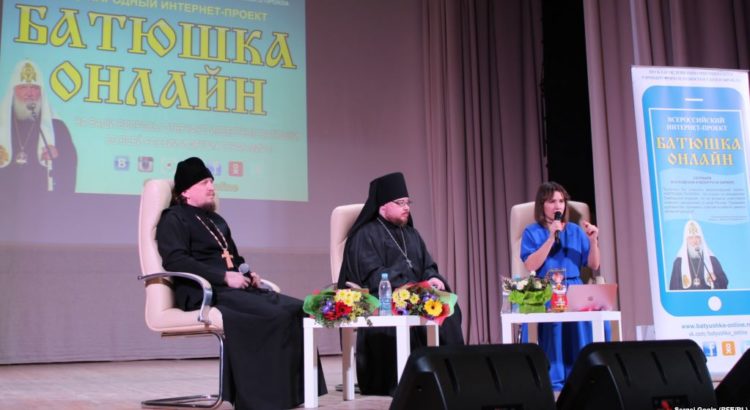Rusia/Mayo de 2017/Fuente: Radio Free Europe
Resumen: A principios de este mes, varios centenares de escolares de la ciudad de Ulyanovsk, en el centro de Rusia, se reunieron en un centro cultural municipal para una asamblea que conmemoraba el sexto aniversario de un único programa de evangelización de la Iglesia Ortodoxa Rusa. «Es más fácil vivir con Dios», dijo a los niños Olga Solntseva, directora del departamento de información suplementaria del Ministerio de Educación y Ciencia de Ulyanovsk. «Espero que todos ustedes comprendan esto, y cuanto antes lo comprendan, mejor». El evento para celebrar el proyecto Padre-Online, un sitio web y una iniciativa de medios de comunicación social en la que los sacerdotes ortodoxos responden a las preguntas enviadas por los jóvenes, fue la última de una serie de acontecimientos que tienen muchos rusos cuestionando la relación apropiada entre la iglesia y el estado En la Rusia contemporánea. También este mes, un blogger en Ekaterimburgo recibió una sentencia de tres años y medio de prisión suspendida por jugar Pokemon Go en una iglesia ortodoxa y por mensajes en Internet que supuestamente ofendieron a los creyentes negando la divinidad de Jesús.
Earlier this month, several hundred schoolchildren in the central Russian city of Ulyanovsk were gathered in a municipal cultural center for an assembly marking the sixth anniversary of a unique Russian Orthodox Church youth-outreach program.
«It’s easier to live with God,» Olga Solntseva, director of the department of supplemental information of the Ulyanovsk Oblast’s Ministry of Education and Science, told the children. «I hope that all of you will understand this. And the earlier you understand it, the better.»
The event to celebrate the Father-Online project, a website and social-media initiative in which Orthodox priests answer questions submitted by youths, was just the latest in a spate of developments that has many Russians questioning the proper relationship between the church and the state in contemporary Russia.
Also this month, a blogger in Yekaterinburg was given a 3 1/2-year suspended prison sentence for playing Pokemon Go in an Orthodox church and for Internet posts that allegedly offended believers by denying the divinity of Jesus.
Since the collapse of the Soviet Union more than a quarter-century ago, Russians have wrestled with the role of religion and the Orthodox Church. Under the constitution, Russia is a secular state with a strict separation of church and state. However, President Vladimir Putin has emphasized what he describes as traditional Russian values and has identified the church as a central pillar of Russian national identity. He and other officials in his government maintain close personal and public relations with representatives of the church.
A solid majority of Russians identify themselves as Orthodox Christians, but only a small fraction — particularly among younger Russians — attend church regularly or observe Orthodox rituals.
According to a 2016 poll by the independent Levada Center research agency, 34 percent of Russians said religion plays an important or very important role in their lives. Twenty-one percent of respondents agreed that Orthodox believers should have «legal advantages» over other people in society.
Only 17 percent said they believe the church has too much influence on government policy. Nineteen percent said there is no place for religion in the schools (up from 10 percent in 1991), while 13 percent said schools should teach «God’s law» in schools to «everyone who wishes it» (down from 20 percent in 1991).
The Father-Online project is an attempt by the church to engage with Russian youth. Over the last six years, organizers say, priests have used the program to respond to over 200,000 queries on topics from the quotidian to the existential. The responses, however, tend to boil down to a narrow set of recommendations: go to church, observe the sacraments, obey the commandments, pray, and submit to the will of God. Patriarch Kirill has endorsed the project and urged more priests to participate in it.
About two years ago, the online initiative launched a real-world version. Through the program, priests have visited dozens of schools throughout Ulyanovsk Oblast. Father-Online is actively promoted by both the Ulyanovsk regional and municipal governments and boasts joint projects with the culture and education departments of both levels.
It is believed to be a pet project of former Ulyanovsk city Education Director Lyudmila Solomenko, who, before she stepped down in 2012, was noted for her devotion to the church and for decorating her office with Orthodox icons. During her time in office, schools were regularly ordered to take students to Orthodox exhibitions or on field trips to local churches. She also ordered some schools to display copies of a particular icon associated with learning.
In 2015 and 2016, the project has received 370,000 rubles in direct grants from the government. Its advertisements are also prominently displayed on government billboards and laudatory videos about the program appear on the local administration’s YouTube channel:
The May 20 assembly to mark the project’s sixth birthday was hosted by 30-year-old Nadezhda Zemskova in the slick style of a DJ, peppering her presentation with fashionable neologisms and urging participants to take selfies with the priests and to «check in» on social media.
The questions posed at the event were sent by audience members to the priests onstage by SMS.
One girl said she had recently broken up with her boyfriend and asked, «Why do boys say they love you and then leave you?» In response, Zemskova called up a video in which Moscow priest Pavel Ostrovsky discusses the sin of fornication, stressing that it is a «mortal» sin.
«That’s a very good answer,» Zemskova said as the video ended.
Supporters of the project dismiss questions about whether the government’s support and the appearances of the project in Ulyanovsk schools are a violation of the constitution.
«A secular education separate from the church only means that there cannot be calls directly for prayers during lessons,» said Vasily Dronov, who is a representative of the local eparchy and a teacher of religious culture.
Archbishop Dmitry Savelyov told RFE/RL that as long as there are no religious services at the Father-Online events, there are no violations.
«Service are forbidden in schools,» he said. «But a priest or a mullah or an activist with some political party espousing an ideology can come to class. This is not forbidden. The children study the foundations of Orthodox culture and world religious culture, so I sometimes attend parents’ meetings and explain the course. There is no legal problem here.»
Ulyanovsk lawyer Nadezhda Semyonova, however, argued that the project itself does not violate the constitution but that the «action of the teachers of the schools — acting in the name of the state — in bringing someone from Father-Online into the educational process or taking their students to some event featuring the priests» is a violation.
«Making the Orthodox Church ‘more equal’ than other religions violates Article 14 of the constitution,» Semyonova said.
One of the teachers attending the May 20 assembly who asked not to be identified expressed doubt that the program will have the desired results in the long run.
«My children are baptized,» he said. «They know the symbols of faith. But I would not allow them to attend such an event as this.»
«It is as if someone made a signal and they began acting zealously,» the teacher added. «But all this has the opposite effect on me. The project is just bureaucratism. … If we continue in this direction, I can’t imagine what people are going to think of the church.»
«To be honest,» he confessed, «at one point I was ready to take my children out of this event. But I understood that I would just be disciplined for doing it, since all our managers were sitting there. … As an employee, I have to obey the orders I get. One person is not an army.»
Fuente: https://www.rferl.org/a/russian-orthodox-church-social-media-connecting-youth-clerics-constitution/28513697.html











 Users Today : 102
Users Today : 102 Total Users : 35460008
Total Users : 35460008 Views Today : 147
Views Today : 147 Total views : 3418612
Total views : 3418612